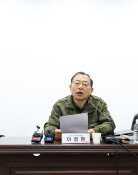[Editorial] The Republic of Korea on the Centenary of the Eulsa Treaty
[Editorial] The Republic of Korea on the Centenary of the Eulsa Treaty
Posted November. 17, 2005 07:58,
Today marks the centenary of the forced Eulsa Treaty in 1905 through which Japan took away Koreas diplomatic rights. With this treaty, Korea degraded into a protectorate of Japan, losing its roots as a sovereign state. That painful experience lingers today in the adjective, eulsinyeon-like, which means impoverished or gloomy. Five years after the fateful day of national destruction when Korea was forced to sign the treaty, this nation fell entirely into the hands of Japan. The nation was dead.
Then are we truly learning from history and finding a vision that will lead us into the future? Do we pursue diplomacy that wisely strengthens our national interest? The Roh Moo-hyun administration put forth an awkward concept of self-reliance, gravely shaking the Korea-U.S. alliance which has served as a pillar of Koreas national development. In its foreign policies toward Japan, the administration aggravated the instability of the Korea-Japan relations, jumping from not mentioning the past history to a declaration of a diplomatic war.
The Asia Pacific Economic Cooperation (APEC) Summit in Busan and Korea-China and the U.S.-Japan summits that took place yesterday are all venues for competition and control of national interests. Four of the six nations engaging in the six-party talks aimed at resolving the North Korean nuclear issue the U.S., China, Japan, and Russia are the very powers that fiercely competed against each other on the Korean peninsula 100 years ago for their respective national interests. Without an accurate interpretation of and proactive response to the dynamics of the stark international order, Koreas situation would be no different from that of a century ago.
First, Korea lacks the ability to objectively interpret the international situation and to collect information. Japan won the Russo-Japanese War two months prior to the signing of the treaty and had its superior rights over Korea acknowledged by signing the Portsmouth Treaty. In July that year, the U.S. and Japan signed the Taft-Katsura Secret Treaty, which paved the way for Japan to hold power over this land. In August that year, Japan also created a background to guide, monitor, and protect Chosun in the revised Britain-Japan alliance. Korea was the only one that was not aware of all these behind-the-scenes bargaining and planning between powers.
The government of the Great Korean Empire failed to grasp the tense reality, naively expecting the U.S. to uphold the Korea-U.S. Treaty and deter Japans ambitions. However, President Roosevelt considered it favorable for the U.S. interests to support Japan and actively advised Japan during the Portsmouth meeting. In short, Koreas ignorant and incompetent diplomacy drove the nation into destruction.
What about the Republic of Korea now? While the U.S.-Japan alliance has become the closest one ever, Korea-U.S. alliance is swaying with discord. The Roh administrations ideological excess and leaning towards North Korea-friendliness has brought about a national identity crisis. Excessive pro-Chinese policies have led to concerns that it would threaten the Korea-U.S.-Japan collaboration. The loss of growth engines has dimmed the nations economic future. On top of that, a leadership of hostility that regenerates and magnifies internal conflict is pulling the nation into the mire of division. Where is R.O.K going?







